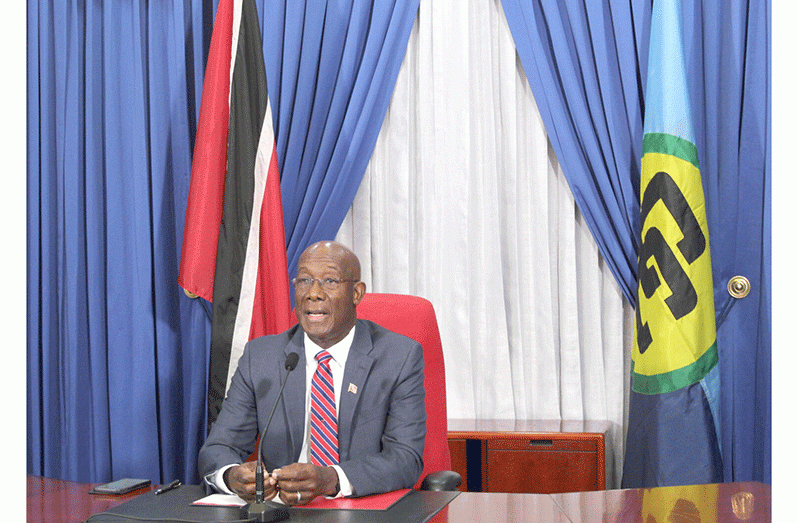PM Rowley says; maintains Venezuela is aware of this position, region must remain a zone of peace
PRIME Minister of Trinidad and Tobago, Dr. Keith Rowley, has reiterated the Caribbean Community’s (CARICOM) steadfast support for Guyana amidst the border controversy with Venezuela and has made it clear that the region must remain a “zone of peace.”
He made these positions known while addressing questions during a recent press conference regarding his country’s relations with Venezuela, which is pursuing a referendum on December 3 to annex Guyana’s Essequibo region.
“We are confident that the Governments of Venezuela and Guyana would know that CARICOM’s position that our region must be and remains a zone of peace is the best position for all of us. And secondly, we all know that even in the darkest hour, Trinidad and Tobago’s position was that if difficulties arise, the response ought to be dialogue, dialogue and dialogue,” Dr Rowley said.
He pointed out that the bedrock of the principal position must be that the region remains a “zone of peace” and Guyana must know that it has the support of CARICOM, a stance he said is well known to Venezuela.
“Let us not overreact or overreach… It will be a tragedy if we misunderstand what is happening and mishandled it,” Dr Rowley said.
Recently, Prime Minister of St Vincent and the Grenadines, Ralph Gonsalves, said that the CARICOM has always been in support of Guyana’s territorial integrity.
The Vincentian PM made those remarks during a joint press conference with Barbados Prime Minister, Mia Mottley, in Barbados.
Gonsalves said the ongoing controversy between Venezuela and Guyana is an old one, noting that Guyana bases its position on the 1899 Arbitral Award.
Gonsalves said: “CARICOM has always defended the territorial inviolability of Guyana.”
Meanwhile, Prime Minister Mottley said that CARICOM has issued a very strong statement in support of Guyana.
She said that while she stated some weeks back that in spite of the controversy, Venezuela is a friend of the region as well, so she would wish to see the region remain one of peace.
Mottley related that this statement has excited condemnation; however, she added: “I have come to public life to promote peace not division.”
She went on to add that Guyana’s position has been strong and unwavering, and this position has been one that is backed by the region.
Mottley said they understand that where there is “not the appropriate opportunity to keep temperatures down, things can happen that go beyond control.”
The genesis of the border controversy goes back to the 1899 Arbitral Award, a landmark decision that delineated the land boundary between British Guiana (now Guyana) and Venezuela.
However, despite the historic arbitration, tensions have persisted, with Venezuela repeatedly challenging the validity of the award.
In 2018, Guyana took a decisive step by approaching the ICJ, seeking affirmation of the 1899 Arbitral Award’s legitimacy.
Venezuela, taking a defiant stance, initially claimed that the ICJ lacked jurisdiction, a contention flatly rejected by the international court in a crucial ruling in December 2020. The door was thus opened for the ICJ to delve into the substantive case’s merits.
Recent developments have heightened the geopolitical situation, as Venezuela, through its National Electoral Council, unveiled plans for a “Consultative Referendum” on December 3, 2023.
Guyana contends that this move is a thinly veiled attempt by Venezuela to gather support for abandoning the ongoing ICJ proceedings, and unilaterally assert control over the Essequibo region.
In response, Guyana swiftly approached the ICJ, seeking urgent provisional measures to prevent any actions by Venezuela that could jeopardise the status quo until the court reaches a final verdict on the matter.
The ICJ is expected to rule on Guyana’s request for provisional measures to prevent Venezuela from proceeding with its planned referendum on the Essequibo.
However, Venezuela’s Vice-President, Delcy Rodriguez, has expressed her nation’s complete disregard for the ICJ’s authority in addressing the border controversy.
The substantive case which highlights the historical context and the 1899 Arbitral Award, remains before the World Court.












